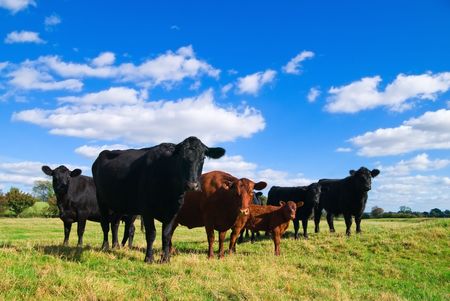Pasture bloat, also known by cattle owners as frothy bloat, is a real concern for many cattle producers. Concerns about pasture bloat are understandable since bloat can result in death of as many as 15 to 20 percent of the cattle in the pasture. Here’s a look at pasture bloat, the symptoms, causes and how to prevent it.
 Symptoms
Symptoms
Cattle that are affected by pasture bloat may begin showing symptoms in as little as one hour after being put in a bloat-prone pasture, which means that the time frame between when cattle begin showing symptoms and death can occur can be only a few hours.
Affected cattle can be easily identified by a large protrusion that appears on their left side that rises above the vertebral column resulting skin that becomes taut. Cattle may also exhibit grunting, dyspnea, tongue protrusion, mouth breathing and frequent urination. Deceased cattle will also display significant bloating around the abdomen.
Causes
Pasture bloat is a nutritional disease that is caused by foam forming in the rumen, notes Progressive Cattleman. This foam interferes with normal belching processes of the cattle’s ruminant digestive system, leading to trapped gas in the rumen that leads to a blockage. As this continues, the gas continues to build up pressure in the rumen, causing it to expand until it suffocates the animal by compressing its diaphragm and lungs.
Small-grain pastures like wheat or legumes like clover or alfalfa are the most likely to be a problem. These plants are high in sugars and proteins which are released into the rumen quickly. As these plants break down in the stomach, they produce a stable foam. Pastures experiencing a late winter regrowth are often the most concerning, as a late freeze can rupture plant cells, which accelerates the digestive process and formation of stable foams. While exceptionally nutritious, uncontrolled grazing on such plants can easily lead to bloat.
Prevention
There are several strategies for preventing pasture bloat without completely keeping animals off these high-yield small-grain pastures. The two main options are developing an effective grazing management plan or providing cattle with nutritional supplements.
From a grazing management standpoint, one option is to overstock these small fields when used at times that pasture bloat is most likely to be a concern. Cattle that are able to consume large amounts of small-grain forage in a short period of time are most susceptible due to their rapid intake, and by overstocking the pasture, ranchers can limit the amount of grazing available for each animal. Another option is to wait until the forage is more mature, as fully grown plants will have an increased fiber content of the forage, in turn reducing the risk of bloat.
Another option is using nutritional supplements to reduce the risk of pasture bloat. Two supplements that have proven to help are poloxalene and monensin.
Monensin has been shown to reduce the severity and likelihood of bloat in calves at a cost of only pennies per day for each animal. It can also be mixed with soybean hulls or corn for simple dosing, and the use of monensin has been shown to reduce incidences of pasture bloat by increasing the pH in the animals’ stomachs while also improving the digestibility of forage and the fluid passage rate of cattle, says Progressive Cattleman.
Poloxalene is another supplement that can help to reduce pasture bloat A bit more expensive than monensin, this surfactant disrupts the stability of foam that may form in the stomach. It has been shown to be more effective against pasture bloat than monensin. Instead of routine monensin dosing, farmers could also use poloxalene exclusively during periods of peak bloat concern.
You work hard to produce the best cattle possible in your herd and protecting your high-quality animals is always a top priority. At Flying H Genetics, we only offer healthy, Superior-quality animals. Using extensive genetic screening and breeding techniques to produce SUPERIOR GENETICS have been our top priority since 1948. To learn more about bulls and females available, call or text 308-962-6500 or go to www.flyinghgenetics.com today to learn how our leading knowledge of genetics can help improve your operation.



